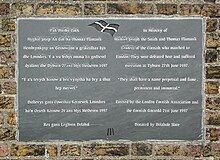
Bodmin is a town and civil parish in Cornwall, England, United Kingdom. It is situated south-west of Bodmin Moor.

The Lizard is a peninsula in southern Cornwall, England, United Kingdom. The most southerly point of the British mainland is near Lizard Point at SW 701115; Lizard village, also known as the Lizard, is the most southerly on the British mainland, and is in the civil parish of Landewednack, the most southerly parish. The valleys of the river Helford and Loe Pool form the northern boundary, with the rest of the peninsula surrounded by sea. The area measures about 14 by 14 miles. The Lizard is one of England's natural regions and has been designated as a National Character Area 157 by Natural England. The peninsula is known for its geology and for its rare plants and lies within the Cornwall Area of Outstanding Natural Beauty (AONB).

The Prayer Book Rebellion or Western Rising was a popular revolt in Cornwall and Devon in 1549. In that year, the first Book of Common Prayer, presenting the theology of the English Reformation, was introduced. The change was widely unpopular, particularly in areas where firm Catholic religious loyalty still existed, such as Lancashire. Along with poor economic conditions, the enforcement of the English language led to an explosion of anger in Cornwall and Devon, initiating an uprising. In response, Edward Seymour, 1st Duke of Somerset sent John Russell to suppress the revolt, with the rebels being defeated and its leaders executed two months after the beginning of hostilities.
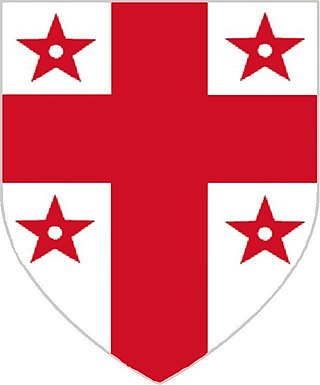
Thomas Flamank was a lawyer and former MP from Cornwall, who together with Michael An Gof led the Cornish rebellion of 1497, a protest against taxes imposed by Henry VII of England.

St Keverne is a civil parish and village on The Lizard in Cornwall, England, United Kingdom.
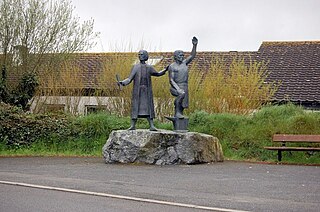
The Cornish rebellion of 1497, also known as the First Cornish rebellion, was a popular uprising in the Kingdom of England, which began in Cornwall and culminated with the Battle of Deptford Bridge near London on 17 June 1497.

The history of Cornwall goes back to the Paleolithic, but in this period Cornwall only had sporadic visits by groups of humans. Continuous occupation started around 10,000 years ago after the end of the last ice age. When recorded history started in the first century BCE, the spoken language was Common Brittonic, and that would develop into Southwestern Brittonic and then the Cornish language. Cornwall was part of the territory of the tribe of the Dumnonii that included modern-day Devon and parts of Somerset. After a period of Roman rule, Cornwall reverted to rule by independent Romano-British leaders and continued to have a close relationship with Brittany and Wales as well as southern Ireland, which neighboured across the Celtic Sea. After the collapse of Dumnonia, the remaining territory of Cornwall came into conflict with neighbouring Wessex.

The culture of Cornwall forms part of the culture of the United Kingdom, but has distinct customs, traditions and peculiarities. Cornwall has many strong local traditions. After many years of decline, Cornish culture has undergone a strong revival, and many groups exist to promote Cornwall's culture and language today.
An Gof was a militant Cornish nationalist group suspected of a series of attacks in the 1980s. The name was also used by a group in 2007.

Humphrey Arundell of Helland in Cornwall, was the leader of Cornish forces in the Prayer Book Rebellion early in the reign of King Edward VI. He was executed at Tyburn, London after the rebellion had been defeated.
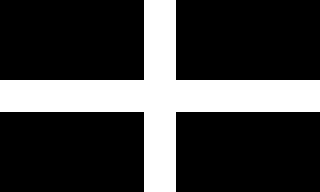
Cornish nationalism is a cultural, political and social movement that seeks the recognition of Cornwall – the south-westernmost part of the island of Great Britain – as a nation distinct from England. It is usually based on three general arguments:

This timeline summarizes significant events in the History of Cornwall

James Tuchet, 7th Baron Audley was a British nobleman and the only lord to fully join the Cornish rebellion of 1497 opposing the rule of Henry VII of England. He was a leader in the rebel army's march to the edge of London, and in its defeat at the Battle of Deptford Bridge. Captured on the battlefield, he was sentenced for treason and beheaded. His peerage was forfeited, but restored to his son in 1512.
Events from the 1490s in England.
The Second Cornish uprising occurred in September 1497 when the pretender to the throne Perkin Warbeck landed at Whitesand Bay, near Land's End, on 7 September with just 120 men in two ships.

Cornish devolution is the movement to increase the governing powers of the County of Cornwall.
John Flamank or Flamoke, of Boscarne, near Bodmin, Cornwall, was an English politician.
Gilbert Flamank or Flamoke, of Boscombe near Bodmin, Cornwall, was an English politician.
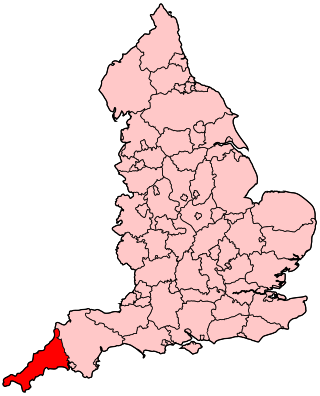
The following outline is provided as an overview of and topical guide to Cornwall: Cornwall – ceremonial county and unitary authority area of England within the United Kingdom. Cornwall is a peninsula bordered to the north and west by the Celtic Sea, to the south by the English Channel, and to the east by the county of Devon, over the River Tamar. Cornwall is also a royal duchy of the United Kingdom. It has an estimated population of half a million and it has its own distinctive history and culture.
Presented below is an alphabetical index of articles related to Cornwall:
